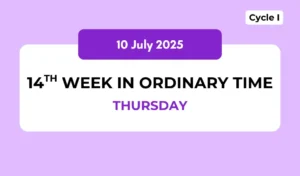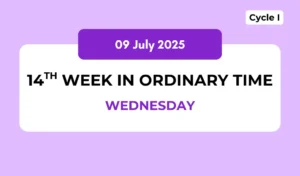First Week of Lent
23rd February 2024 (Friday)
Psalter: Week 1
Reading of the Day
First Reading: Ezekiel 18:21-28
Thus says the Lord God: “If a wicked person turns away from all his sins that he has committed and keeps all my statutes and does what is just and right, he shall surely live; he shall not die. None of the transgressions that he has committed shall be remembered against him; for the righteousness that he has done he shall live. Have I any pleasure in the death of the wicked, declares the Lord God, and not rather that he should turn from his way and live? But when a righteous person turns away from his righteousness and does injustice and does the same abominations that the wicked person does, shall he live? None of the righteous deeds that he has done shall be remembered; for the treachery of which he is guilty and the sin he has committed, for them he shall die. “Yet you say, ‘The way of the Lord is not just.’ Hear now, O house of Israel: Is my way not just? Is it not your ways that are not just? When a righteous person turns away from his righteousness and does injustice, he shall die for it; for the injustice that he has done he shall die. Again, when a wicked person turns away from the wickedness he has committed and does what is just and right, he shall save his life. Because he considered and turned away from all the transgressions that he had committed, he shall surely live; he shall not die.
Psalm 130:1-2, 3-4, 5-6ab, 6c-8 (R. 3)
R/. If you, O Lord, should mark iniquities, Lord, who could stand?
Verse Before The Gospel
V/. Glory and praise to you, O Christ
R/. Glory and praise to you, O Christ
V/. Cast away from you all the transgressions that you have committed, says the Lord, and make yourselves a new heart and a new spirit.
R/. Glory and praise to you, O Christ.
Gospel : Matthew 5:20-26
At that time: Jesus said to his disciples, “I tell you, unless your righteousness exceeds that of the scribes and Pharisees, you will never enter the kingdom of heaven. “You have heard that it was said to those of old, ‘You shall not murder; and whoever murders will be liable to judgment.’ But I say to you that everyone who is angry with his brother will be liable to judgment; whoever insults his brother will be liable to the council; and whoever says, ‘You fool!’ will be liable to the hell of fire. So if you are offering your gift at the altar and there remember that your brother has something against you, leave your gift there before the altar and go. First be reconciled to your brother, and then come and offer your gift. Come to terms quickly with your accuser while you are going with him to court, lest your accuser hand you over to the judge, and the judge to the guard, and you be put in prison. Truly, I say to you, you will never get out until you have paid the last penny
Daily Gospel Reflection
Highlight: Surpassing ways!
Guidelines: In a world that always contents itself with the minimums, the disciples of Christ must go farther to the maximum. Minimums will not reach us to the kingdom
1. As followers of Christ, certainly we desire to enter heaven. Jesus gives us the way to make it. It is to make our righteousness exceed that of the Pharisees and scribes. Now their righteousness consisted of the observance of laws and traditions. It was righteousness confined to legalism, that is, to follow the letter of the law.
2. Instead, we must go beyond, the letter to the spirit of the law. The letter gets caught with the details of the law. But the spirit goes behind and beneath, beyond and above, to the purpose and the aim of it. Their righteousness lacked the right intention and the depth of following the law. It was heartless and shallow.
3. True following of the law blends together both the right intention and action, both the heart and life, both devotion and dedication, and both faith and charity. In other words, it is going from the minimum to the maximum.
4. The minimum is to be bothered only about how to keep the law. But the maximum is concerned about how to live by the law. The minimum thinks only of avoiding the negative, what is prohibited. But the maximum seeks to fulfil the positive, what is required, praiseworthy and beneficial.
5. In the light of the gospel, the minimum is to avoid murder but the maximum is to avoid even the subtle forms of murder, like anger, humiliation, and offence. The minimum is to avoid or ignore the enemies or keep away from them, those who are not good to us. But the maximum is to take the initiative to get reconciled to them.
6. In the light of the first reading from Ezekiel, the true righteousness is to repent over the evil, turn to good and persevere in the good. Anyone who does not continue faithful to the good but turns away from it will incur God’s judgment.
7. Even if one has been righteous for long and then turns away from good and turns toward evil, he is liable to God’s punishment. The point here is not a mathematical comparison of how much good or evil. Or how long? Or which is more and longer? The whole issue is whether one turns away from evil and turns to good and remains steadfast in the good.
Practice: We must constantly rise above practising devotions to experiencing devotion, and rise above observing laws to living their spirit. What is important is not following a religion but following the Lord







